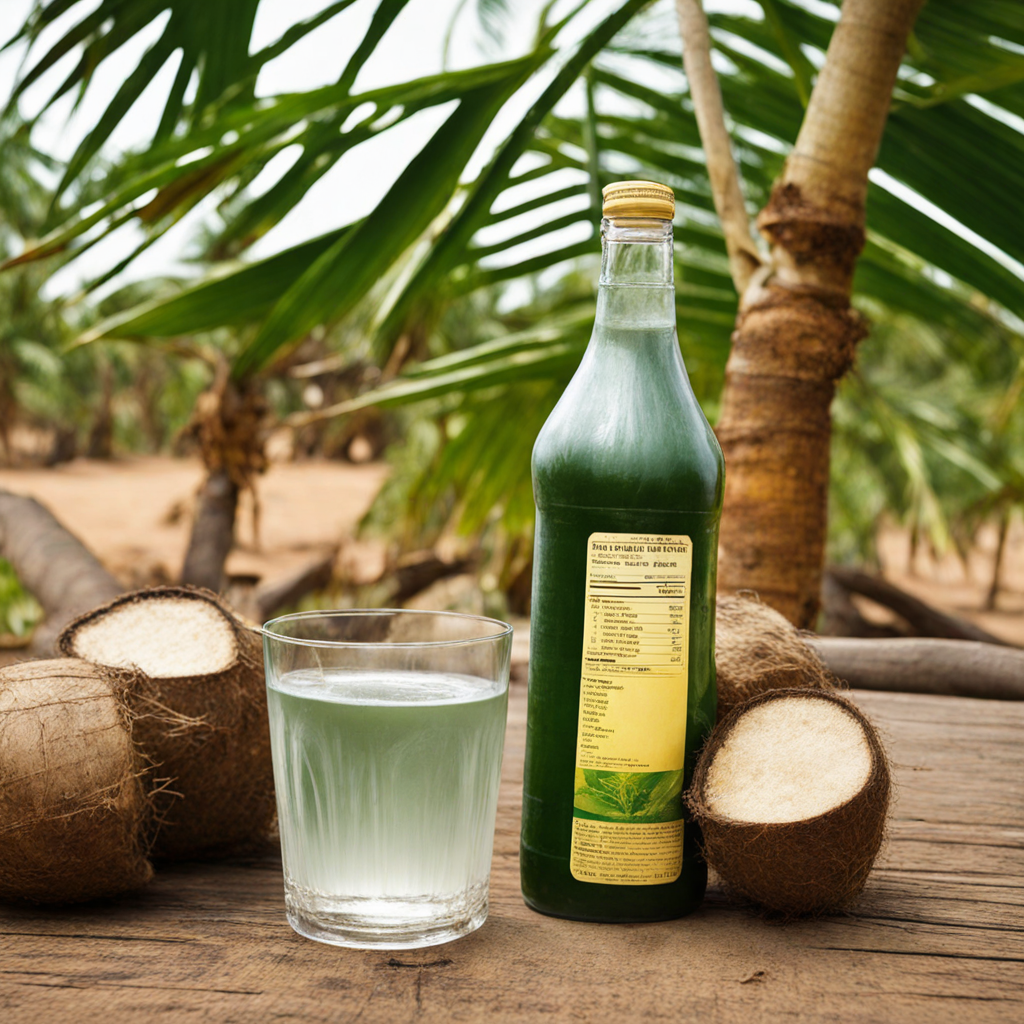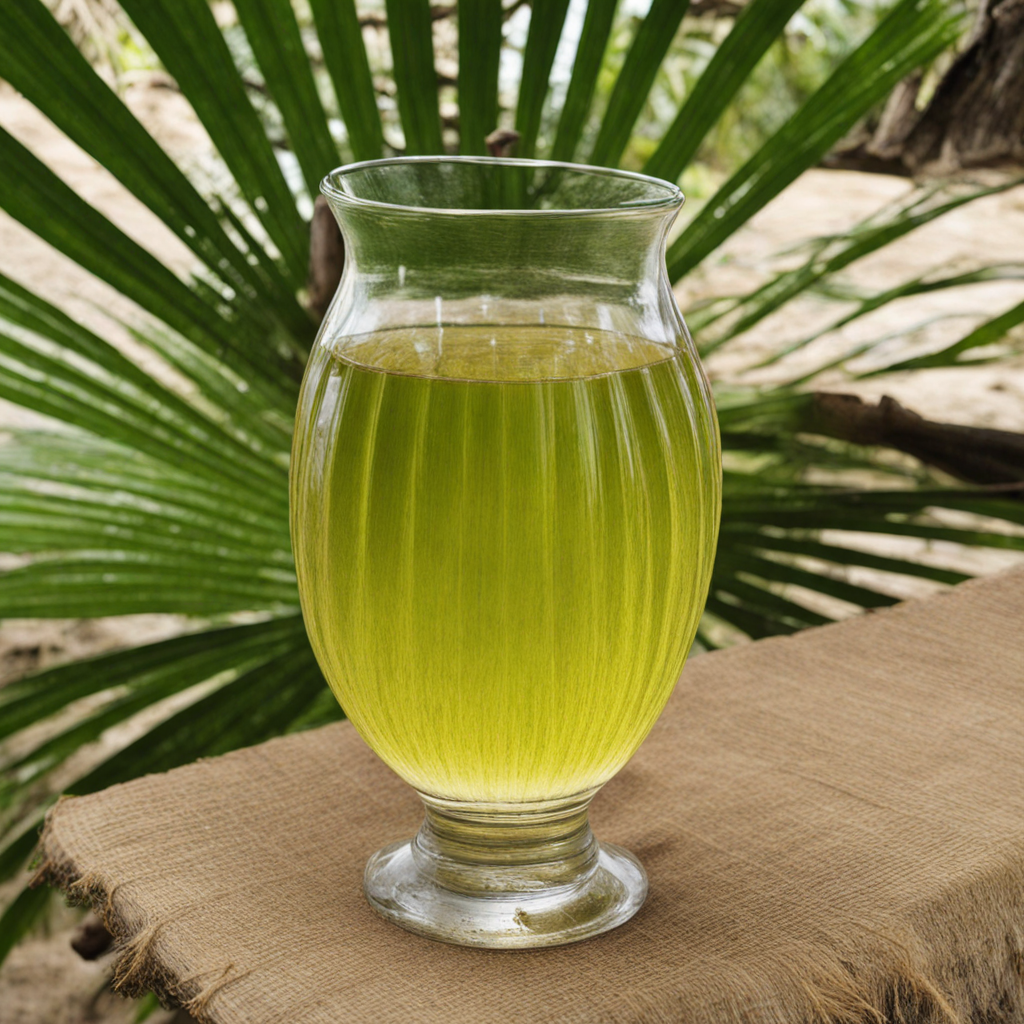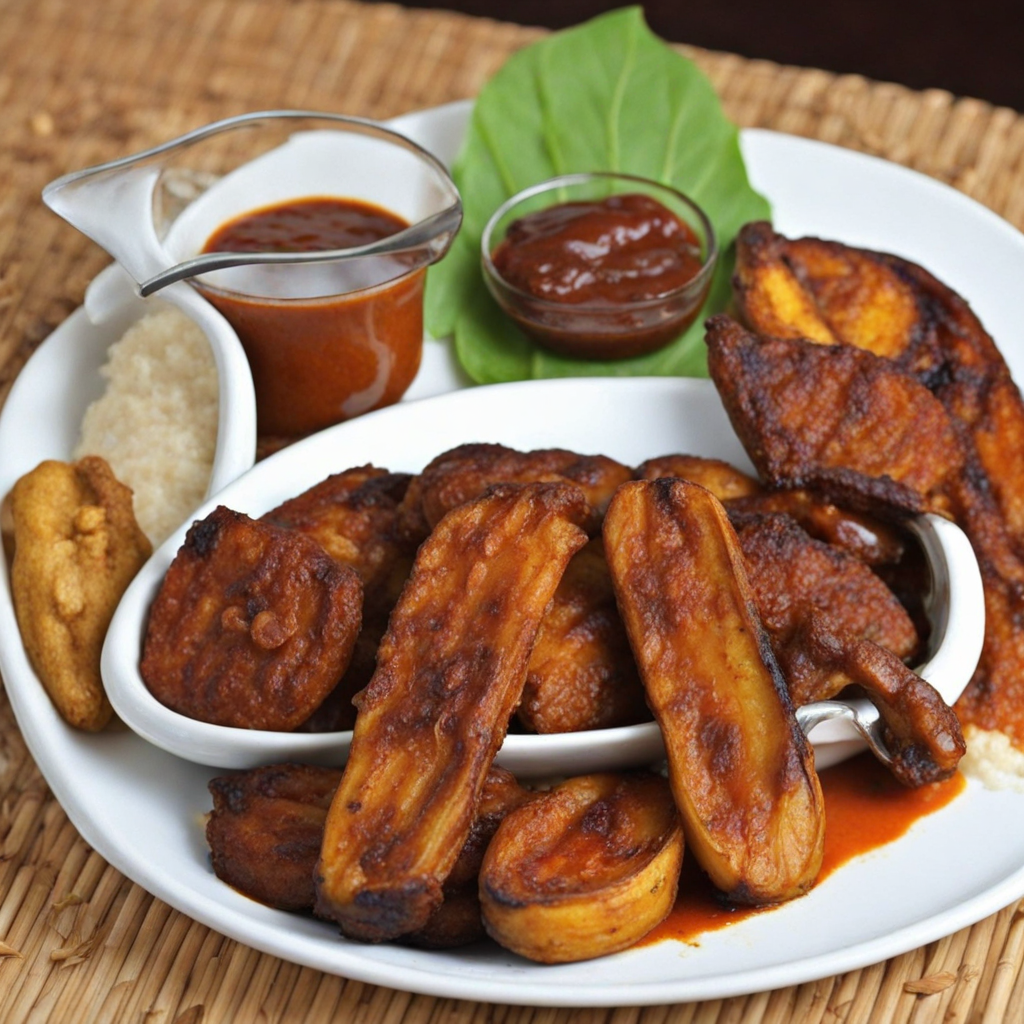Palm Wine
Palm wine, known locally as "toddy" or "ewuro," is a traditional alcoholic beverage derived from the sap of various palm trees, particularly the oil palm and the raffia palm. This unique drink is often tapped fresh from the tree and is celebrated for its sweet, slightly tangy, and refreshing flavor. The taste can vary depending on the palm species and the fermentation process, resulting in a delightful combination of sweetness and a subtle effervescence, making it an enjoyable experience for the palate. Served in calabashes or traditional cups, palm wine is often enjoyed chilled, enhancing its refreshing qualities, especially in the warm climates of Nigeria. The process of harvesting palm wine is a cultural ritual in itself. Local palm wine tapers climb the tall palm trees to collect the sap, which is best when consumed fresh. Once tapped, the sap can ferment quickly, transforming into a slightly alcoholic drink in just a few hours. This delightful beverage is not only cherished for its taste but also for its social significance, often enjoyed during celebrations, gatherings, and communal feasts. Its presence at these events reflects the bonds of friendship and community, as it is typically shared among friends and family. Pairing palm wine with local dishes enhances the overall culinary experience. Its natural sweetness complements spicy and savory Nigerian foods, such as jollof rice, pepper soup, and various grilled meats. The drink's lightness serves as a perfect counterbalance to the robust flavors found in Nigerian cuisine, creating a harmonious blend of tastes that tantalizes the taste buds. For those seeking a new flavor adventure, palm wine offers a unique glimpse into the rich culinary traditions of Nigeria, promising an unforgettable taste experience that is both refreshing and culturally significant.
How It Became This Dish
The History of Palm Wine in Nigeria Palm wine, a traditional alcoholic beverage derived from the sap of various species of palm trees, holds a distinctive place in the cultural and social fabric of Nigeria. With a history that stretches back centuries, this effervescent drink is not merely an intoxicant; it is a symbol of community, festivity, and ancestral ties. The evolution of palm wine in Nigeria is a fascinating tale interwoven with the country’s diverse ethnic cultures, economic practices, and rituals. #### Origins of Palm Wine The origins of palm wine can be traced to the indigenous peoples of West Africa, where the palm tree thrives in the humid tropical climate. In Nigeria, the most commonly tapped species include the oil palm (Elaeis guineensis) and the raffia palm (Raphia spp.). The traditional method of harvesting palm wine involves cutting the flower buds of the palm tree to collect the sap that oozes out, which is then fermented naturally by the wild yeasts present in the environment. The practice of tapping palm wine likely predates recorded history, as it is deeply embedded in the agricultural and social traditions of the Nigerian people. Ethnobotanists and historians theorize that its origins can be linked to early agricultural societies that began to cultivate palm trees for their multiple uses, including food, shelter, and medicine. The fermentation process that transforms the sap into palm wine is both an art and a science, reflecting the knowledge and skills passed down through generations. #### Cultural Significance In Nigeria, palm wine is more than just a drink; it is a cultural artifact that plays a vital role in various ceremonies and communal gatherings. Among different ethnic groups, palm wine is often referred to by different names—“nsafufuo” in the Akan language of the Yoruba, “mmanu” among the Efik, and “ewuro” among the Igbo—each name reflecting the unique cultural context of its consumption. Palm wine is traditionally used during important social events such as marriages, funerals, and festivals. For instance, in Yoruba culture, palm wine is customarily served during weddings as a symbol of joy and unity. The act of sharing palm wine among friends is considered a gesture of friendship and hospitality, creating bonds that transcend social and economic differences. At funerals, palm wine serves as an offering to the ancestors, linking the living with the spiritual world and honoring the deceased. Moreover, palm wine is often associated with storytelling and music. In many villages, it is common to gather in the evening to drink palm wine while sharing stories, singing songs, and dancing. This communal aspect highlights the social importance of palm wine, transforming it into a vehicle for cultural expression and collective memory. #### Development Over Time The history of palm wine in Nigeria has not only been influenced by local customs but has also been shaped by external factors, including trade, colonization, and globalization. During the pre-colonial era, palm wine was an essential commodity in local trade, exchanged for goods and services among various communities. Its popularity attracted traders from distant regions, leading to a burgeoning market that connected different ethnic groups. The arrival of European colonizers in the 19th century brought significant changes to the land and its people, including the commercialization of palm products. The oil palm became a vital export, driving economic interests in palm cultivation. While the focus on oil production grew, traditional practices surrounding palm wine continued to flourish, albeit in a changing landscape. The colonial economy often marginalized indigenous beverages, promoting European drinks, which led to a decline in traditional consumption in urban areas. In the post-colonial period, Nigeria experienced a cultural renaissance that saw a revival of interest in traditional foods and beverages, including palm wine. Scholars, chefs, and cultural advocates emphasized the importance of indigenous foods as part of Nigeria’s identity. This revival was paralleled by an increase in the establishment of palm wine bars and lounges in urban centers, catering to a new generation eager to reconnect with their cultural heritage. Today, palm wine is experiencing a renaissance not only as a traditional drink but also as a trendy beverage among younger Nigerians. It is often blended with various flavors, including fruits and spices, creating innovative cocktails that appeal to modern palates. This evolution reflects a dynamic cultural exchange where traditional practices are adapted to contemporary lifestyles while retaining their historical roots. #### Palm Wine in Contemporary Nigeria In contemporary Nigeria, palm wine continues to hold a dual identity as both a traditional and modern beverage. Its production has also been influenced by advancements in agricultural practices, with efforts to enhance tapping methods and fermentation techniques. While traditional tapping remains prevalent, some producers have begun to adopt more commercial approaches to meet the growing demand. Palm wine has also gained recognition beyond Nigeria’s borders. It has become a symbol of Nigerian culture in diaspora communities, where it serves as a reminder of home and heritage. Cultural festivals and events often feature palm wine, allowing expatriates to connect with their roots and share their traditions with a broader audience. Furthermore, the health benefits of palm wine have garnered attention in recent years. Rich in vitamins, minerals, and antioxidants, palm wine is celebrated for its potential medicinal properties, including digestive and anti-inflammatory benefits. This growing awareness has contributed to its appeal, especially among health-conscious consumers. #### Conclusion The story of palm wine in Nigeria is one of resilience and adaptation. From its ancient origins as a simple fermented beverage to its current status as a cultural icon, palm wine embodies the rich tapestry of Nigerian life. It is a drink that nourishes not only the body but also the spirit, fostering community and connection across generations. As Nigeria continues to evolve, palm wine remains a steadfast symbol of its cultural heritage, celebrated in both traditional and modern contexts. Through its enduring legacy, palm wine serves as a reminder of the importance of preserving cultural practices in an ever-changing world.
You may like
Discover local flavors from Nigeria






